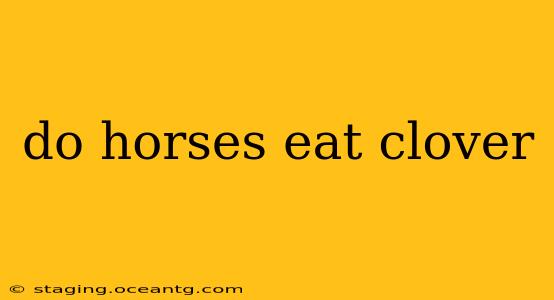Do Horses Eat Clover? A Deep Dive into Equine Nutrition
Horses are herbivores with a digestive system specifically designed to process plant matter. While their diet can vary based on breed, age, workload, and environment, the question of whether or not they eat clover is a common one among horse owners and enthusiasts. The answer, simply put, is yes, horses do eat clover, but with important caveats.
Clover, a member of the legume family, is a nutritious and palatable forage for horses. It's rich in protein, essential minerals, and vitamins, making it a valuable addition to a horse's diet. However, there are crucial considerations regarding its inclusion in a horse's feeding regimen.
What Types of Clover Do Horses Eat?
Several types of clover are suitable for horses, including:
- Red Clover: This is a widely available and popular type of clover. It's known for its high protein content.
- White Clover: This clover is also a good source of nutrients and is often found in pastures.
- Alsike Clover: This variety is less common in horse pastures but is still safe for consumption in moderation.
However, it's crucial to avoid certain clovers like sweet clover, which contains coumarin. Coumarin can cause bleeding disorders in horses if consumed in large quantities. Always carefully identify any clover before introducing it to your horse's diet.
How Much Clover Should a Horse Eat?
While clover offers nutritional benefits, it shouldn't constitute the entirety of a horse's diet. Overconsumption can lead to several issues, including:
- Bloat: Clover, being a legume, can cause bloat in horses, particularly if consumed in large quantities or if the horse is already prone to digestive upsets. Bloat is a serious condition that requires immediate veterinary attention.
- Laminitis: While not directly caused by clover, overconsumption of lush, high-sugar forages like clover can contribute to laminitis, a painful and potentially debilitating hoof condition.
- Nutrient Imbalances: Excessive clover can lead to nutrient imbalances in a horse's diet, potentially affecting their overall health.
A balanced diet should incorporate a variety of forages, including grasses, to provide a wider range of nutrients and prevent these problems. Consult with a veterinarian or equine nutritionist to determine the appropriate amount of clover, if any, to include in your horse's diet.
Can Clover Be Harmful to Horses?
While generally safe, clover can be harmful to horses if certain precautions aren't taken:
- Moldy or Spoiled Clover: Never feed horses moldy or spoiled clover. This can cause serious health problems.
- Overgrazing: Overgrazing can lead to nutrient deficiencies and potentially expose the horse to toxins.
- Individual Sensitivities: Some horses may have individual sensitivities to clover, resulting in digestive upset or other reactions.
Always monitor your horse for any adverse reactions after introducing clover to their diet.
What are the benefits of feeding horses clover?
Clover offers several nutritional advantages:
- High Protein: Provides a valuable source of protein crucial for muscle growth and maintenance, especially in growing horses or those undergoing strenuous activity.
- Essential Minerals and Vitamins: Contributes to overall health and well-being through the provision of vital minerals and vitamins.
- Palatability: Horses generally find clover palatable, making it a good addition to a mixed diet.
Is it okay to feed horses only clover?
No, it is not advisable to feed horses solely clover. A balanced diet containing a variety of forages, hay, and potentially grain (depending on the horse's needs) is crucial for optimal health. Clover, while nutritious, lacks the full spectrum of nutrients a horse requires for thriving.
In conclusion, while horses can and do eat clover, it's essential to approach its inclusion in their diet with caution and awareness. A balanced diet, regular veterinary checkups, and mindful pasture management are critical to ensuring the health and well-being of your equine companion. Remember to always consult a veterinarian or equine nutritionist for personalized dietary advice.
